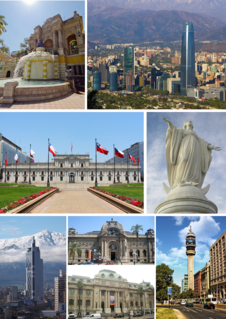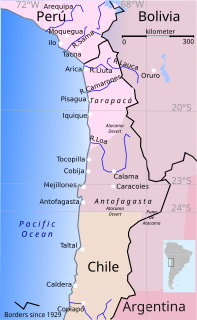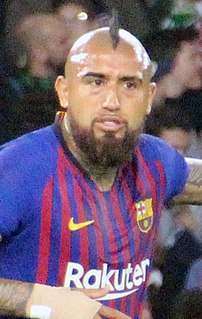
Chile, officially the Republic of Chile, is a South American country occupying a long, narrow strip of land between the Andes to the east and the Pacific Ocean to the west. It borders Peru to the north, Bolivia to the northeast, Argentina to the east, and the Drake Passage in the far south. Chilean territory includes the Pacific islands of Juan Fernández, Salas y Gómez, Desventuradas, and Easter Island in Oceania. Chile also claims about 1,250,000 square kilometres (480,000 sq mi) of Antarctica, although all claims are suspended under the Antarctic Treaty.

Santiago, is the capital and largest city of Chile as well as one of the largest cities in the Americas. It is the center of Chile's largest and most densely populated conurbation, the Santiago Metropolitan Region, whose total population is 7 million. The city is entirely located in the country's central valley. Most of the city lies between 500 m (1,640 ft) and 650 m (2,133 ft) above mean sea level.

Concepción is a Chilean city and commune belonging to the metropolitan area of Greater Concepción, it is one of the largest urban conurbations of Chile. It has a significant impact on domestic trade being part of the most heavily industrialized region in the country. Its location is in the called Zona Centro Sur, in the geographic center of the country, and it is the capital of the Concepción Province and Bío Bío Region. It sits about 500 km south of Santiago, the country's capital.

The War of the Pacific, also known as the Saltpeter War and by multiple other names was a war between Chile and a Bolivian-Peruvian alliance. It lasted from 1879 to 1884, and was fought over Chilean claims on coastal Bolivian territory in the Atacama Desert. The war ended with victory for Chile, which gained a significant amount of resource-rich territory from Peru and Bolivia. Chile's army took Bolivia's nitrate rich coastal region and Peru was defeated by Chile's navy.
Chilean music refers to all kinds of music developed in Chile, or by Chileans in other countries, from the arrival of the Spanish conquistadors to the modern day. It also includes the native pre-Columbian music from what is today Chilean territory.

The Mapuche are a group of indigenous inhabitants of south-central Chile and southwestern Argentina, including parts of present-day Patagonia. The collective term refers to a wide-ranging ethnicity composed of various groups who shared a common social, religious and economic structure, as well as a common linguistic heritage as Mapudungun speakers. Their influence once extended from the Aconcagua River to the Chiloé Archipelago and spread later eastward to the Argentine pampa. Today the collective group makes up over 80% of the indigenous peoples in Chile, and about 9% of the total Chilean population. They are particularly concentrated in Araucanía. Many have migrated to the Santiago and Buenos Aires area for economic opportunities.

The University of Chile is a public university in Santiago, Chile. It was founded on November 19, 1842 and inaugurated on September 17, 1843. It is the oldest and the most prestigious in the country. It was established as the continuation of the former colonial Royal University of San Felipe (1738), and has a rich history in academic, scientific and social outreach. The university seeks to solve national and regional issues and to contribute to the development of Chile. It is recognized as one of the best universities Latin America for its leadership and innovation in science, technology, social sciences, and arts through the functions of creation, extension, teaching, and research.

The 1973 Chilean coup d'état was a watershed moment in both the history of Chile and the Cold War. Following an extended period of social unrest and political tension between the opposition-controlled Congress of Chile and the socialist President Salvador Allende, as well as economic warfare ordered by US President Richard Nixon, Allende was overthrown by the armed forces and national police.

The Chile men's national football team(Selección masculina de fútbol de Chile) represents Chile in major international football competitions and is controlled by the Federación de Fútbol de Chile which was established in 1895. The team is commonly referred to as La Roja. They have appeared in nine World Cup tournaments and were hosts of the 1962 FIFA World Cup where they finished in third place, the highest position the country has ever achieved in the World Cup. Since the mid to late 1960s, the Elo ratings ranks Chile among the 10 strongest football teams in the world.

Arica is a commune and a port city with a population of 222,619 in the Arica Province of northern Chile's Arica y Parinacota Region. It is Chile's northernmost city, being located only 18 km (11 mi) south of the border with Peru. The city is the capital of both the Arica Province and the Arica and Parinacota Region. Arica has a mild, temperate climate with some of the lowest annual rainfall rates anywhere in the world, consequently there are rarely any clouds over Arica. Arica is located at the bend of South America's western coast known as the Arica Bend or Arica Elbow. At the location of the city are two lush valleys that dissect the Atacama Desert converge: Azapa and Lluta. These valleys provide fruit for export.

Verónica Michelle Bachelet Jeria is a Chilean politician who served as President of Chile from 2006 to 2010 and again from 2014 to 2018, the first woman to occupy the position. After leaving the presidency in 2010 and while not immediately reelectable, she was appointed the first executive director of the newly created United Nations Entity for Gender Equality and the Empowerment of Women. In December 2013, Bachelet was reelected with over 62% of the vote, bettering the 54% she obtained in 2006. She was the first President of Chile to be reelected since 1932.

The General Captaincy of Chile or Gobernación de Chile, was a territory of the Spanish Empire, from 1541 to 1818. It comprised most of modern-day Chile and southern parts of Argentina. Its capital was Santiago de Chile. In 1818 it declared itself independent, becoming the Republic of Chile. It had a number of Spanish governors over its long history and several kings.

Arturo Erasmo Vidal Pardo is a Chilean professional footballer who plays as a midfielder for Spanish club Barcelona and the Chile national team. His displays during his time at Juventus led him to be nicknamed Il Guerriero, Rey Arturo and La Piranha by the Italian press due to his hard-tackling and aggressive, tenacious style of play.

Chileans are people identified with the country of Chile, whose connection may be residential, legal, historical, or cultural. For most Chileans, several or all of these connections exist and are collectively the source of their Chilean identity. Chile is a multilingual and multicultural society, home to people of many different ethnicities and religions. Therefore, many Chileans do not equate their nationality with ethnicity, but with citizenship and allegiance to Chile. The overwhelming majority of Chileans are the product of varying degrees of admixture between European ethnic groups with Amerindian peoples indigenous to Chile’s modern territory.

Club de Deportes Iquique S.A.D.P. is a Chilean football club based in Iquique that is a current member of the Campeonato Nacional. Founded in 1978, the club's home stadium is the Estadio Municipal de Cavancha, which has a 3,500 capacity.

The President of Chile, officially known as the President of the Republic of Chile is the head of state and the head of government of Chile. The President is responsible for both the Chilean government and state administration. Although its role and significance has changed over the history of Chile, as well as its position and relations with other actors in the national political organization, it is one of the most prominent political figures. It is also considered as one of the institutions that make up the "Historic Constitution of Chile", and is essential to the country's political stability.
La Florida Airport is an airport serving La Serena, a Pacific coastal city in the Coquimbo Region of Chile. This is one of a few major Chilean airports with an east-west runway.
The Conquest of Chile is a period in Chilean historiography that starts with the arrival of Pedro de Valdivia to Chile in 1541 and ends with the death of Martín García Óñez de Loyola in the Battle of Curalaba in 1598, and the destruction of the Seven Cities in 1600 in the Araucanía region.

Augusto José Ramón Pinochet Ugarte was a Chilean general, politician and dictator of Chile between 1973 and 1990 who remained the Commander-in-Chief of the Chilean Army until 1998 and was also President of the Government Junta of Chile between 1973 and 1981.

The 2015 Copa América was the 44th edition of the Copa América, the main international football tournament for national teams in South America, and took place in Chile between 11 June and 4 July 2015. The competition was organized by CONMEBOL, South America's football governing body.



















